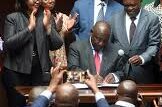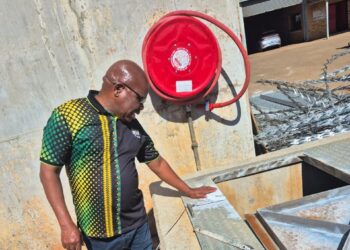Working class and poor communities offer contrasting views on funding
NKANGALA – There are contrasting views between the working class and poor communities regarding the National Health Insurance (NHI).
The Bill, approved by Cabinet on 10 July 2019 and tabled in Parliament on 26 July 2019, was signed into law on 15 May 2024. The NHI aims to provide access to quality healthcare services for all South Africans. At its core, the NHI seeks to address the disparities that have long affected the country’s healthcare system, ensuring that everyone, regardless of financial situations, gets quality medical care.
However, its funding model appears to be contentious to some. “As a taxpayer, I am unhappy with the bill being placed because I feel it is unfair to taxpayers,” said a Steve Tshwete resident who preferred to remain anonymous. One of the NHI’s objectives is to pull funds from various sources, including general tax revenue and mandatory contributions, to finance healthcare services for the entire population. This will be achieved by establishing a single-payer system. Under the proposed framework, healthcare providers, both public and private, will play an imperative role in delivering services to NHI beneficiaries.
“They should be fixing the public healthcare system instead of continuing to deduct money from us workers when we already earn so little,” said another anonymous resident from the same municipality.
In contrast, the poor segment of society have a different perspective. “It is a good thing that we will all go to the same hospitals and clinics. I like it 100 percent,” said jobless Timothy Leope from Lynville, Emalahleni.
Sybil Seloane, from Emakhazeni, told the paper, “The NHI will level the medical playing field. Right now, in South Africa, there are two kinds of healthcare, one for the poor and another for the rich. I think the NHI will try to eliminate these inequalities. We will all have equal access.”
The South African Medical Association (SAMA) says South Africa’s healthcare system is not ready for the NHI. “The funding mechanism is flawed in its heavy reliance on general tax revenue, payroll tax, and surcharges on personal income. In particular, the potential financial hardships for poor and middle-class citizens due to the country’s economic challenges,” said SAMA CEO Dr. Mzulungile Theo Nodikida. “As representatives of the medical profession in South Africa, SAMA remains committed to engaging constructively with government stakeholders to develop a comprehensive and effective healthcare policy that prioritises the needs of patients and healthcare providers alike.”
During the opening of a 24-hour clinic in Middelburg two weeks ago, Mpumalanga Health MEC Sasekani Manzini exuded confidence that the province is ready for the NHI, noting that 123 facilities in the province are accredited by the office of health standards compliance (OHSC).
“The rest are still going to be assessed; this means these 123 facilities are a base. For the next five years, they agree we are ready for the NHI,” she said.
























